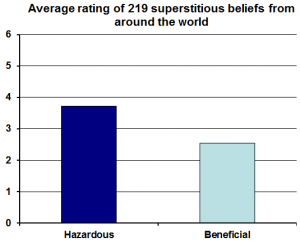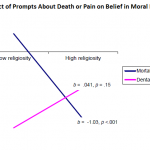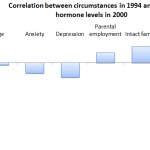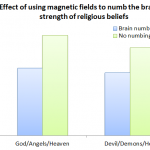A survey of supernatural beliefs across cultures around the world has found that beliefs involving hazards and harms were about 50% more common than beliefs about benefits, opportunities and other good things.
Daniel Fessler, at the University of California, and colleagues searched a representative dataset of 60 cultures held at the Human Relations Area Files and identified a total of 219 supernatural beliefs (there were more than that in total, but they just took a few from each culture). They then got 6 students to rate each according to whether it represented a harm or a benefit.
 That makes a total of 1,314 ratings (219×6), of which 817 (62%) were judgements that the supernatural belief represented a hazard, and the rest were judgements that the belief represented a benefit. Unfortunately, they don’t give data on how many actual beliefs were judged by a majority to be a hazard, which is s shame
That makes a total of 1,314 ratings (219×6), of which 817 (62%) were judgements that the supernatural belief represented a hazard, and the rest were judgements that the belief represented a benefit. Unfortunately, they don’t give data on how many actual beliefs were judged by a majority to be a hazard, which is s shame
This was just part of a larger study into beliefs in general that Fessler and colleagues undertook. For example, they reviewed urban legends using a similar approach, and found that they are even more strongly biased in favour of hazard (77% of all ratings).
They also created fake news items using facts that could be framed as either hazards or benefits. They put these to a group of 977 people in an online study, who rated the ‘hazards’ facts significantly more believable than the ones frames as ‘benefits.
In a clue to what might be going on here, people who felt the world to be a dangerous place were particularly more likely to believe the news items that framed the facts as hazards. That’s a great insight, because there are many other situations in which fear and anxiety have been shown to ratchet up credulity.
What we have here is yet more evidence that our psychology has been deeply shaped by our evolutionary past. In the past, ignoring a clue to a possible benefit meant you might go hungry. But ignoring a clue to a possible hazard meant you could end up dead.
And superstitious beliefs? Well, it’s really hard to tell if reciting ‘MashaAllah’ will really help ward off the evil eye. But in a dangerous world, what have you got to lose?
![]()
Fessler, D., Pisor, A., & Navarrete, C. (2014). Negatively-Biased Credulity and the Cultural Evolution of Beliefs PLoS ONE, 9 (4) DOI: 10.1371/journal.pone.0095167
 This article by Tom Rees was first published on Epiphenom. It is licensed under Creative Commons.
This article by Tom Rees was first published on Epiphenom. It is licensed under Creative Commons.















